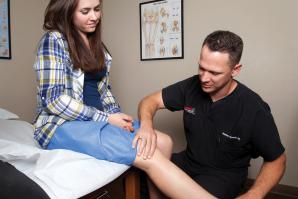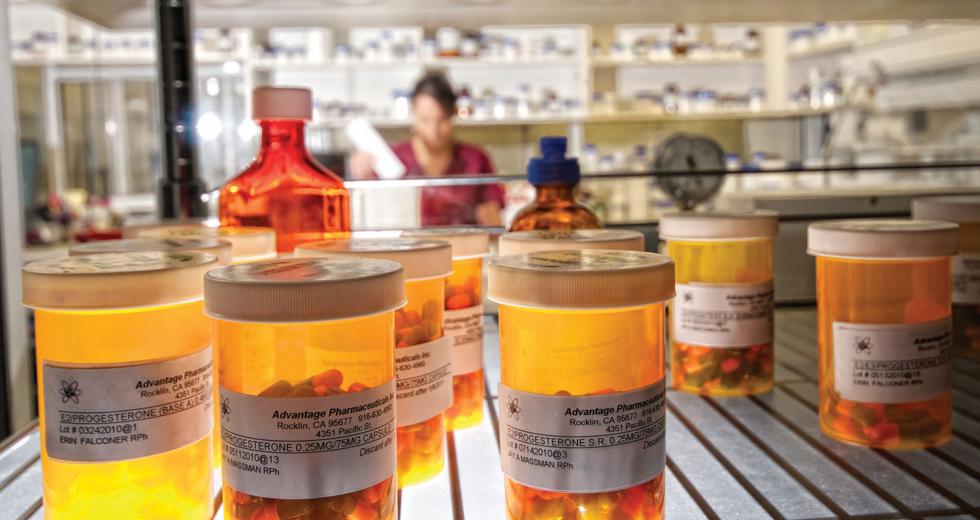Unless you get on the wrong airplane or harbor a relentless cancer, doctors say you can pretty much count on living to be 90. A hundred years ago, it was age 50. For many women, that would have meant dying before menopause. Now it means living half a lifetime with hormones on the fritz.
“All your granola sisters will tell you to let it happen naturally, but if you do it that way, you’re going to come out looking like a granny,” says Dr. Harold Burton, a gynecologist who heads the Unique Balance Hormone & Rejuvenation Center in Rocklin where he provides hormone therapy, vaginal rejuvenation and nutritional supplements.
“The baby boomers are the anti-aging group, and that’s where bioidentical hormones come in,” he says. “They keep you from getting osteoporosis. They help with your sex life, your vaginal lubrication, your heart health.”
Bioidentical hormones are plant extracts chemically modified to be structurally indistinguishable from human hormones. They are available commercially or, more commonly, can be obtained through compounding pharmacies. They have been used in the United States for about the past 50 years, but didn’t hit the mainstream until the early 1990s when the number of compounding pharmacies began to rise.
Before that, synthetic hormones were the primary option for women seeking relief from menopausal symptoms related to hormone imbalance. One of the most popular of the synthetics was and remains Premarin, a drug made from estrogens derived from pregnant mares’ urine and used to treat hot flashes, vaginal dryness and osteoporosis.
“Back when I was in my 50s, they gave me Premarin, the synthetic stuff,” says 75-year-old Roseville resident Barbara Hulse. “Oh man did I suffer. It got to my muscles and joints, and everything got so tight. Two days on that stuff and I could hardly move. I tried it [twice] and had the same problem. I can’t live like that.”
Hulse’s experience with the drug is not exceptional. Common side effects of Premarin and other synthetic hormones include headaches, irregular vaginal bleeding, stomach pain and vomiting, hair loss and yeast infections. Similar side effects have not been widely reported from the use of bioidenticals.
The debate over the possible side effects of hormone therapy became national news in 2004 when pharmaceutical company Wyeth-Ayerst began releasing incomplete information from it’s decade-long Women’s Health Initiative studies of 160,000 women taking its synthetic hormones.
The Women’s Health Initiative was launched in 1991 with clinical trials and a study to test the effects of postmenopausal hormone therapy, diet modification, and calcium and vitamin D supplements on heart disease, fractures, and breast and colorectal cancer.
The hormone trial had two studies: an estrogen-plus-progestin study of women with a uterus and an estrogen-alone study of women without a uterus.
According to the WHI study, women taking estrogen plus progestin experienced an increased risk of heart attack, stroke, blood clots, breast cancer, colorectal cancer and dementia. Women using estrogen without progestin showed an increased risk for heart attack, stroke and blood clots.
“The study was [about] equine estrogen and synthetic progestin, yet all hormone therapy was painted with the results,” Burton says.
The study concluded by recommending that, instead of hormone therapy, women choose alternative measures to relieve their menopausal symptoms, including dressing to avoid being too warm, reducing stress, avoiding spicy foods, alcohol and caffeine; getting enough sleep and being physically active.
“Clearly a man wrote that. They’re out of their ever-loving minds. That is ridiculous. That’s like telling someone with a broken leg not to run a marathon,” says 60-year-old Bonnie Benjamin, a Sonora resident who, for the past five years, has been making the two-hour trip to Sacramento for bioidentical hormone therapy. “It completely misses the point and the underlying causes. It’s treating symptoms not causes, which is typical of Western medicine.”
Suzanne Somers publicized the conversation about bioidentical hormones when she emerged as an advocate of the therapy with the publication of her book, “The Sexy Years,” in 2004. In 2009 she gushed to Oprah viewers about how she had beat her menopausal rut of “sleeplessness and sexlessness and illness and depression,” and she invited cameras into her home to observe her daily diet and routine of rubbing hormone lotion on the inside of her upper arm (estrogen every day and progesterone two weeks a month). She then injects estriol vaginally (the camera crew wasn’t fortunate enough to get that demo).
Then there are her 60 supplements — 40 pills in the morning with a smoothie and the remainder before bed.
She admits her strategy for longevity and quality of life is extreme but claims to have beaten what she calls “the Seven Dwarfs of Menopause: Itchy, Bitchy, Sleepy, Sweaty, Bloated, Forgetful and All Dried Up.”
“Suzanne is at the far end of the spectrum,” says Dr. William Mora, a holistic physician at Health Associates Medical Group in Sacramento. “She probably takes hormones at a higher dose, so instead of the hormones of a 40-year-old woman she wants the hormones of a 30-year-old. Those are levels I might â?¨not recommend. There may be a slightly increased risk of breast cancer if you are using too much, and there could be bleeding problems such as unpredictable or heavy periods, which increase the risk for uterine cancer. But the risks are extremely low if used correctly.”
For the most part, bioidentical hormones are applied topically to the inner arm to allow for quick access to the bloodstream, or they are applied vaginally via cream or injection. Few are taken in pill form because sex hormones do not naturally enter the body through the stomach, and passage through the stomach and liver would require higher doses.
“Balancing hormones is both an art and a science. You can’t just do a blood test or a urine test to determine the amount of hormone needed,” Mora says. “Mostly, it’s based on the symptoms, starting with low doses of hormones and [monitoring] how you feel.”
Suzanne Somers claims bioidentical hormones have helped her beat “the Seven Dwarfs of Menopause: Itchy, Bitchy, Sleepy, Sweaty, Bloated, Forgetful and All Dried Up.”
Because Mora and Burton prefer to alter their patients’ hormone levels incrementally until the correct balance is achieved, they recommend compounded hormones as opposed to packaged hormones available from large pharmaceutical companies, which come in a limited selection of predetermined doses.
Compounding pharmacies handle hormones in powder form. The dosage of any hormone can be measured fractionally, allowing for customizable prescriptions. Consumers say they like it because the compounding pharmacy can put all the necessary hormones into one potion, so instead of paying $20 to $25 per hormone prescription, for example, Hulse pays about $30 for her month’s supply of cream, which includes a number of hormones.
Proponents attest that the benefits of bioidentical hormone therapy go beyond cooling hot flashes and increasing vaginal lubrication. The slowing of osteoporosis as a result of estrogen, and the regrowth of bone with the help of progesterone, are among the possible perks of giving your body the raw materials needed to maintain bone mass on its own terms.
Bone loss accelerates after menopause because of drops in estrogen and other hormones, but hormone therapy has been shown to slow bone loss, especially when used during the decade after menopause. Some physicians are coming to prefer hormone replacement to prescription biphosphonates for treating and reversing osteoporosis.
Boniva, the drug Sally Field promotes, is a biphosphonate and works by hindering the activity of osteoclasts, bone cells that break down bone. Drugs of this class also include Fosamax, Actonel and Reclast.
Biphosphonates can cause adverse effects. They can cause esophageal irritation and ulceration and bone and muscle pain. Fosamax has also been linked to a condition called osteonecrosis, which is the deterioration and possible death of the jawbone, and to an increased risk of atrial fibrillation.
Still bioidentical hormones are not a miracle drug, as Bonnie Thomson can attest. The 56-year-old mother of five has been working with Mora to balance her hormones over the past seven years.
“I heard Suzanne Somers talking about it. I bought one of her books, and there were a lot of similarities with her story and mine, so I did a bunch of research and looked into it,” Thomson says. “It was great at first, but I still get hot flashes. Sometimes I can get good sleep if things are going fine, but sometimes I still have problems falling asleep.”
She also says the hormones boosted her sex drive, “but I was hoping for more. I know that it’s done a lot more for other people than for me, but I think it depends on the type of person you are to begin with.”
Still, Thomson’s hot flashes have diminished from a daily average of a half-dozen to one occasionally in the morning. She says she feels more mentally alert, has more energy, is less “foggy” and has a better general disposition.
“It feels like you go through menopause forever,” she says. “You really have to check out everything you’re doing — your food and whether you’re working out. The hormones can only do so much.”
The standard American diet is high in sugar and other “white” foods such as rice, flour, potatoes, starches and grains. And while those things really have nothing to do with menopause, they certainly don’t help the situation.
“Women who are eating right and exercising and are able to sleep well might not have as many hot flashes, they may not need hormones, and that is attributable to lifestyle,” Mora says.
That’s why Mora and doctors like him pair hormone therapy with nutritional supplements.
“I test for vitamin B-12 deficiency. B-12 does a lot of things — it helps thinking and mood, but it’s also important in your body’s ability to eliminate toxins. You can become anemic in extreme cases; you can become demented. You can live without it, but if you are marginally deficient and you replace it, you will notice more energy, “ Mora says.
He also recommends vitamin D to almost all of his patients, most of which are deficient in the sunshine vitamin because it’s hard to get from food.
“You have to look at the body as a complete system, and that is my biggest pet peeve with modern, Western medicine,” Benjamin says. “They want to look at one tiny thing, when the body is a complex interaction of systems.”
Along with her ration of hormones, which she says have boosted her sex life, her energy and her physical strength, Benjamin takes nutritional supplements, lifts weights, gets cardiovascular exercise and practices yoga and tai chi.
Whatever benefits can be attributed to the hormones, Thomson, Hulse, Benjamin and many other women like them say they’re worth taking — for the rest of their lives if necessary. “You get more fun back in your life,” Thomson says. “If they came up with proof about side effects, then I might reconsider. I don’t want to dry up and look older than I am. This keeps your body healthy and just the way God made it.”
Hulse agrees: “However long I am alive, I will be on these.”
Recommended For You

Avoiding the Pop
Why do so many women tear their ACL, and how can they prevent it?
In one of the crueler twists of sports, ACL tears often happen in freak accidents that you can’t really control. Seventy percent occur without contact. Even more cruelly, a woman is four times more likely than a man to tear the ligament — especially if she’s young and active.

Fate Expectatons
Life expectancy rates for women are declining in some communities
Women in some parts of the United States are dying younger than they did a generation ago.



